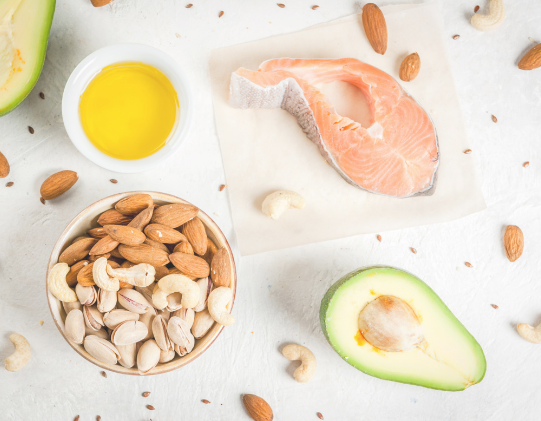
Vitamin D
April 21, 2020
Beginners guide: When and How to Supplement With Ketones
May 5, 2020
Another must-have in your daily supplement stack, in my opinion, is Zinc. I talk a lot about oxidative stress and how the over production of ‘reactive oxygen species’ or ROS in our bodies is one of the three major underlying causes of age-related, degenerative diseases (the other two being glycation and inflammation). Any ingredient that can combat the buildup of oxidative stress is something I always recommend, especially if you want to live a longer and healthier life in the modern world we live in.
What is zinc?
This underappreciated trace mineral is involved in over 300 metabolic processes in our bodies. Trace minerals are needed by the body in small quantities, but are extremely important. Others include manganese, fluoride, iron, copper, iodide, selenium and cobalt. Zinc plays a major role in regulating our immune response, and is why it is found in many over-the-counter drugs sold for cold and flu remedies. It’s also important for protein synthesis, DNA synthesis, wound healing and it has powerful anti-inflammatory and antioxidant properties.
We also need zinc for normal growth and to be able to taste and smell! We need a daily dietary intake of zinc because we don’t have the ability to store it for long periods of time. Interestingly, it is estimated that 10% of the human genome codes for proteins that need zinc to function. That means without enough zinc, 10% of our genes won’t function properly.
Zinc is often a forgotten mineral! Everyone focuses on minerals like potassium, calcium and magnesium, but zinc is one of the most prevalent minerals in our body and a deficiency can wreak havoc on many of our physiological processes.
What does zinc deficiency look like?
Because zinc is involved in so many processes in the body, deficiency can cause a variety of health problems. Most commonly seen is severe immune dysfunction, impaired growth, low testosterone levels and cognitive impairment.
At minor levels of deficiency, impaired immune function is almost always seen. This is because when pro-inflammatory cytokines (substances secreted by immune cells) are released in response to infection, they alter the amount of zinc in our blood, which increases our need for dietary zinc. Of all the zinc in our body, only 1% of it is in the blood – the portion that can be used for the 300 metabolic processes that require zinc.
Symptoms of more severe zinc deficiency include:
- Hypogonadism in males: underfunctioning sex organs
- Hair loss
- Neurosensory changes
- Low libido
- Poor wound healing
- Mood disorders
- Diarrhea
Laboratory blood tests for zinc levels are the best way to test for zinc, although sometimes symptoms can be seen without having abnormal levels in the blood. Certain risk factors for zinc deficiency include inadequate caloric intake, alcoholism and digestive and malabsorption issues.
Vegetarians are also at a greater risk for deficiency because they don’t eat meat – a very good source of bioavailable zinc – and a generally higher intake of phytate-rich foods. Phytates are compounds found in legumes, cereals and grains that bind to zinc and inhibit its absorption. Using preparation techniques like soaking beans, grains and seeds for several hours before cooking them, and allowing them to sprout, can increase the bioavailability of zinc. Including more leavened grain products (such as breads) as opposed to unleavened grains (like crackers and cereals) can also increase zinc absorption as leavening breaks down the phytates.
The main and most easily recognizable warning signs to look out for are hair loss and loss of taste or change in taste.

Zinc & Health
One of the main reasons for zinc deficiency being an underlying factor to several diseases is because any process in the body that requires a rapid turnover rate of cells, requires a lot of zinc. The replication and production of new cells needs zinc to occur. Processes like regeneration of mucosal linings (in the gut, the nasal and throat passages) occurs frequently, skin and hair are continuously being replaced by new cells and lastly, our immune cells are rapidly growing, dividing and maturing. Additionally, growth and repair of cells which is high during recovery from an injury. All of these regenerative processes require the important mineral; zinc.
Let’s take a look at some of the major areas where zinc may impact our health status.
Before you jump into the article, sign up to receive your free guide below!
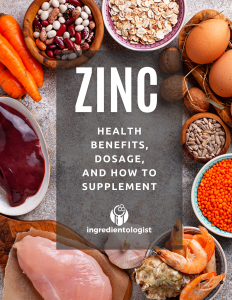 |
|
Immune System
Both the innate and adaptive immune systems are affected by low zinc status, increasing the susceptibility to infection. Zinc plays the role of a ‘second messenger’ in an immune response by binding and signaling to cells to trigger an appropriate response. Macrophages and neutrophils, which are immune cells that destroy pathogens by ‘phagocytosis’ (engulfing and killing), are impaired and natural killer cells are also reduced.
The adaptive immune system consists of T cells (immune cells produced by the thymus gland), and B cells (produced in bone marrow). The production and growth of T cells and B cells is impaired when there isn’t enough zinc in the body. Their function is to recognize foreign cells, like tumor cells or viruses, and to produce an antibody response that works to kill off the infection. This response is dependent on the rapid proliferation of T and B cells, and if this isn’t working properly, our immune system can’t fight off pathogens.
With aging, we see a decline in immune function, called immunosenescence, in a similar way to zinc deficiency which includes poor functioning of the thymus (the gland responsible for producing some of our immune cells: T cells), imbalance in T-cell production and impaired function of immune cells. Supplementing with zinc shows improved immunity and a decrease in inflammatory markers as well as oxidative stress markers.
Hormone Production
The metabolic enzymes that play a role in the production of our hormones rely on zinc. Zinc plays a role in controlling cholesterol levels which is a major precursor to the sex hormones in our body, and without adequate zinc, luteinzing hormone (LH) declines which is a hormone that triggers the production of testosterone.
Most commonly seen is low testosterone levels, but other hormones are affected too like estrogen and thyroid hormones. A study that restricted zinc intake in patients showed that these patients halved their testosterone levels within 5 months, and experienced low libido.
The Common Cold
Zinc lozenges have been used to treat the common cold for many years and studies have shown that they could reduce the duration of the common cold by 33%. Zinc acetate and zinc gluconate have been shown to be effective for treatment and preventing the common cold, although the zinc needs to be in the form of a lozenge, enabling it to reach the infected nasal tissue.
Wound Healing
Zinc helps to maintain the integrity of skin and mucosal membranes, and people with low zinc status show very slow healing rates of ulcers and skin lesions.
Oxidation & Heart Health
Lower LDL cholesterol and overall cholesterol is seen with zinc supplementation. But zinc also acts to improve antioxidant activity by supporting superoxide dismutases – an important antioxidant in the body.
Inflammation
A blood biomarker called CRP or ‘C-reactive protein’ is a good indicator of chronic inflammation. Zinc gluconate taken in 45mg doses was shown to decrease CRP levels. This is closely tied to oxidation because a rise in reactive oxygen species (ROS) causes a rise in oxidized LDL particles (the ‘bad’ cholesterol), which elevates inflammatory markers including CRP. Zinc activates many antioxidant pathways, limiting ROS production and thus lowering inflammation.
Diabetes
Zinc is essential for the functioning of the pancreas and the regulation of blood glucose. The highest concentration of zinc is found in the pancreas cells that secrete insulin, and insulin needs zinc to function properly. Supplementing with zinc can support the signaling of insulin in diabetic patients, improving their ability to regulate their blood glucose.
Depression
Malnourished children show a striking increase in the incidence in violent and anti-social behaviour, depression and anxiety. Additionally, the more depressed someone is, the lower their zinc levels. Zinc in combination with SSRI’s showed a greater improvement in depression compared to antidepressants alone.
Cognition
Learning and memory is carried out by a process called long-term potentiation in the brain – a form of synaptic plasticity which means the ability of your brain to grow and develop neurons. The presence of zinc in the brain is vital in this process. Additionally, zinc acts to regulate the release of neurotransmitters in the brain – the very molecules that control all of the signals in the brain.
Supplementing with zinc can aid in recovery from traumatic brain injury and neurological damage from a stroke.
Diarrhea
Supplementing with zinc may lead to a 9-23% shorter duration of the symptoms of diarrhea.
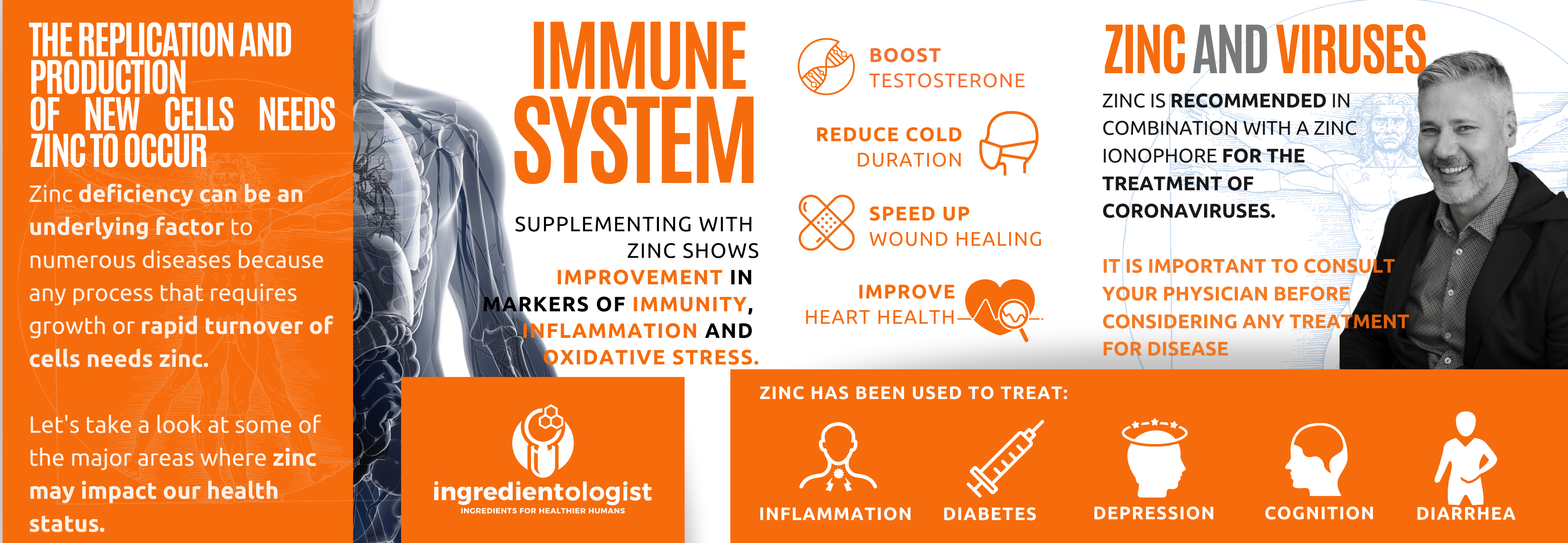
Supplementing with zinc
If you’re eating a diet where most of your zinc comes from phytate rich foods, or you have any of the risk factors mentioned above, you may need to supplement with zinc. Another time you may want to supplement is if you suspect the onset of a cold or flu, when you want to support your immune system, or when you’re in a need for rapid growth and repair of cells in the case of an injury, for example.
However, as with vitamin D, you would want to check your blood levels with your doctor to better know whether you need to supplement or not. Below is a table showing the blood levels of zinc that represent deficiency levels to intoxicating levels. Blood levels of zinc don’t always determine whether you have a deficiency or not, because zinc inside the cell is what is important, and this is not what’s measured. You may have low zinc in the blood, but have adequate levels inside your cells. In fact, low zinc levels cause an increase in copper absorption and so elevated copper levels can be a helpful indicator that zinc is in fact deficient.
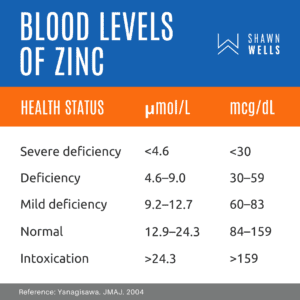
A zinc lozenge is especially effective for colds as it supplies a steady release of zinc over 20-30 minutes, allowing you to absorb more and get into the throat and nasal tissues a lot quicker, which can stop viral replication in infected tissues when you start feeling symptoms.
Taking zinc daily is a good preventative method to ensure your immune system is functioning optimally. You can’t ‘load up’ on zinc because of our body’s inability to store zinc.
Zinc supplements can be in a tablet or gel form, but also in a spray or a lozenge.
Dose
The recommended daily allowance (RDA) is 11mg for men and 8mg for women with a tolerable upper level intake of 40mg per day. Anything above this may decrease your ability to absorb enough copper – another mineral we need, and the reason you may see copper added to zinc supplements.
Additionally, supplementing with iron may decrease zinc absorption so taking any supplemental iron at a different time than zinc can help avoid this problem.
I usually recommend 10-15mg of zinc per day. It is best taken on an empty stomach as you will absorb 60-70% of the zinc this way, which is enough. If you take your supplement with a meal, you may be inhibiting the absorption of the zinc.
It is often recommended to increase your zinc intake by up to 220mg a day when you’re experiencing a cold or flu. When I do this, I take 18-24mg every 2 hours, but only for a couple of weeks. Separating these into 2-3 doses a day is better to maximize absorption. Taking larger doses should only be done for short periods, like 2 weeks at a time to avoid the negative effects of too much zinc.
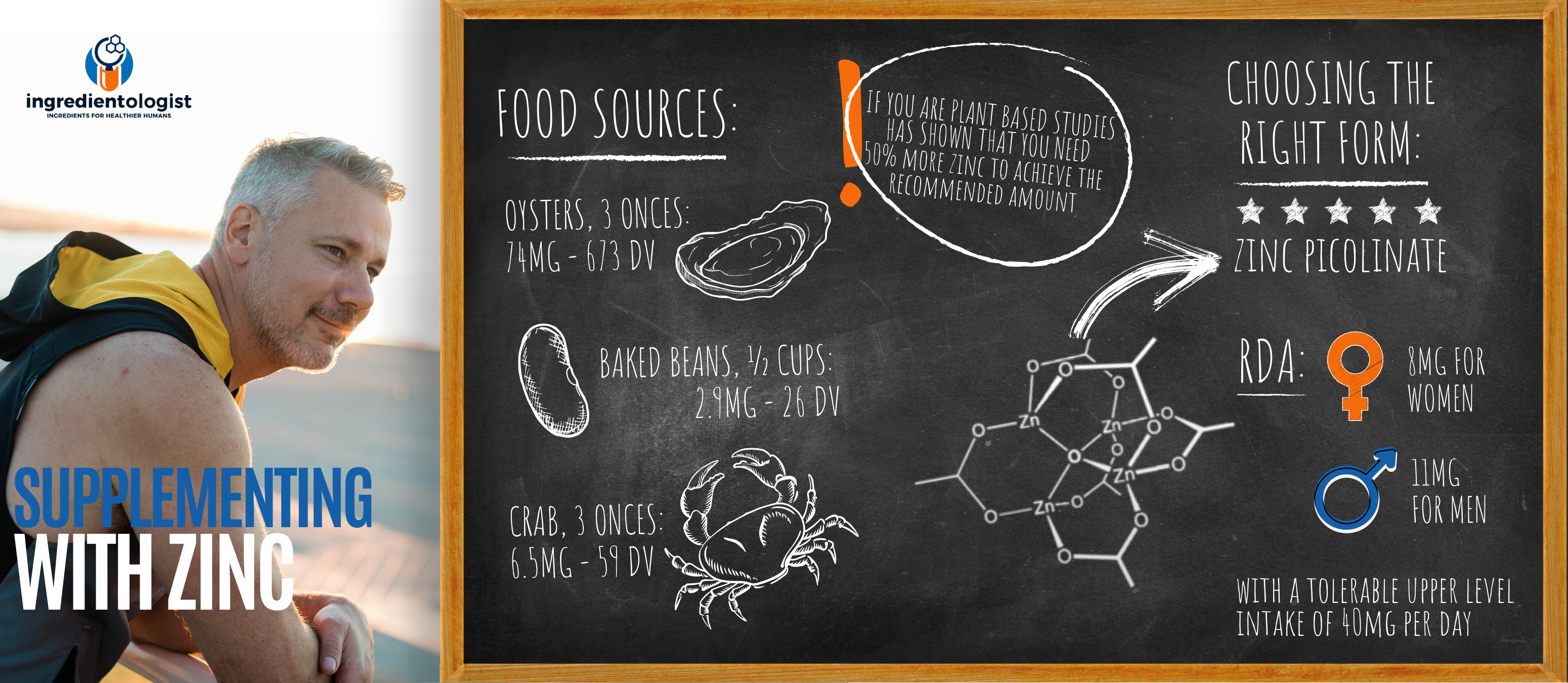
Choosing the right form
Most supplements on the market come as zinc that is bound to another compound, like a protein, acid or a salt. For example, there is zinc sulphate, zinc gluconate, zinc picolinate, zinc citrate or zinc acetate. This means that a large portion of what you’re getting is the compound bound to zinc, with the rest being elemental zinc. The recommended dose refers to the amount of elemental zinc (of which you should be aiming for 10-15mg per day).
Zinc sulfate is the cheapest, but is not absorbed very well. Research shows that zinc picolinate is absorbed better than zinc citrate and gluconate and is therefore preferred. Zinc carnosine is also a good form as studies have shown that when zinc is bound to carnosine it releases zinc into the gut at a slower rate, allowing better absorption.
I have tried a variety of brands, and like to use Thorne’s zinc picolinate, NOW (Zinc gluconate), Doctor’s Best (Zinc carnosine) or Bulletproof (Zinc orotate) for zinc supplements.
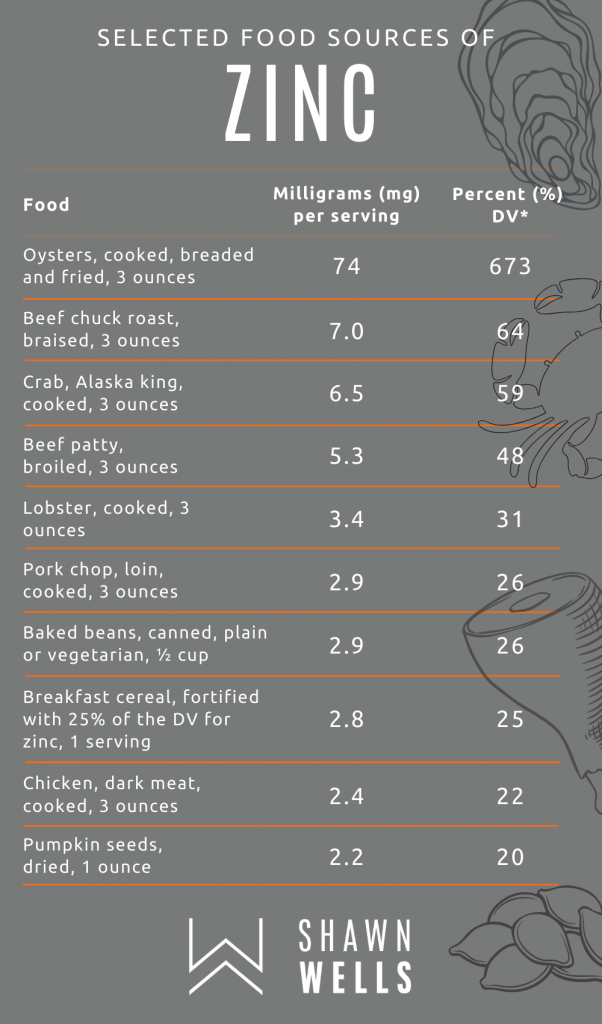
Food Sources
The majority of zinc in our diets comes from red meat and poultry, but oysters contain the most amount of zinc per serving. Cheese, dark chocolate and cashews are also good sources of zinc. There are many grain based foods like cereals as well as beans and some nuts and seeds that are high in zinc, but as mentioned above, these contain phytates, inhibiting the zinc absorption in the gut.
If you rely on these plant-based foods to get your zinc, scientists suggest that you may need 50% more zinc to achieve the recommended amount.
You can time your meals to ensure you have optimal zinc absorption. Eat zinc rich foods at different times to eating grains, legumes, nuts and seeds.
Zinc & Viruses
Given the current state in the world, I wanted to touch on the effect that zinc can have on viruses. To understand exactly how zinc can help protect us from viruses, we need to take a look at some molecular biology for a second.
A virus contains genetic material, just like we have DNA, that allows it to create the proteins that it uses to function and grow. When we make proteins, we first convert DNA into RNA, but unlike us, viruses just have RNA. When a virus infects a human, it releases its RNA into our cells and because it is structured in the same way as our RNA, our cell’s machinery ‘reads’ this RNA and makes a viral protein called ‘RNA-dependent RNA polymerase’ or ‘replicase’. This viral protein, replicase, can now read more of the viral RNA that is injected into our cells to produce viral proteins that allow the virus to replicate and spread.
I hope I didn’t lose any of you, but this is where zinc comes in. Zinc has the ability to shut down the viral replicase enzyme. Remember, this replicase is necessary for the virus to replicate, so if we can stop that, we can stop the virus from growing in number. This is good news, but there is one problem: zinc cannot get into our cells easily – where the replicase is located. Zinc is a positively charged ion, which means that it needs a special transporter called a ‘zinc ionophore’ that acts as a gate for zinc to enter the cell. Luckily, we know of two compounds that act like zinc ionophores in our cells: chloroquine and quercetin.
There are zinc ionophores already present in our cell membranes, but only tiny amounts of zinc can enter the cell. So taking zinc alone may still be somewhat beneficial.
This is the reason that zinc is recommended in combination with a zinc ionophore for the treatment of viruses. Trials are being carried out in China and the USA to explore this further.
It is important to consult your physician before considering any treatment. We need more controlled clinical trials to confirm these findings.
To sum it up, zinc is quite crucial for a healthy immune system and the regeneration, growth and repair of our cells. It offers protection against the common cold and some other viral diseases. You should make sure your diet provides you with enough, but not too much zinc by including the foods rich in zinc and avoiding phytate-rich foods.
Always consult your doctor before implementing any of these recommendations. I would love to know if you have been using any zinc supplements and what your experience has been. Share your favorite brands in the comments below, or tag me on instagram @ingredientologist so I can share it! 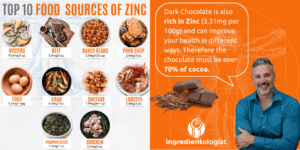
References
https://ods.od.nih.gov/factsheets/Zinc-HealthProfessional/#en60
Haase H, Rink L. The immune system and the impact of zinc during aging. Immun Ageing. 2009;6:9. Published 2009 Jun 12. doi:10.1186/1742-4933-6-9
Rao G, Rowland K. PURLs: Zinc for the common cold–not if, but when. J Fam Pract. 2011;60(11):669–671.
The effects of zinc supplementation on wound healing and metabolic status in patients with diabetic foot ulcer: A randomized, double-blind, placebo-controlled trial. Momen-Heravi M1,2, Barahimi E1, Razzaghi R1, Bahmani F3, Gilasi HR4, Asemi Z Wound Repair Regen. 2017 May;25(3):512-520. doi: 10.1111/wrr.12537
Hemilä H. Zinc lozenges and the common cold: a meta-analysis comparing zinc acetate and zinc gluconate, and the role of zinc dosage. JRSM Open. 2017;8(5):2054270417694291. Published 2017 May 2. doi:10.1177/2054270417694291
Dietary Reference Intakes for Vitamin A, Vitamin K, Arsenic, Boron, Chromium, Copper, Iodine, Iron, Manganese, Molybdenum, Nickel, Silicon, Vanadium, and Zinc https://www.ncbi.nlm.nih.gov/pubmed/25057538
Zinc ionophore activity of quercetin and epigallocatechin-gallate: from Hepa 1-6 cells to a liposome model. Dabbagh-Bazarbachi, Clergeaud G, Quesada IM, Ortiz M, O’Sullivan CK, Fernández-Larrea JB. J Agric Food Chem. 2014 Aug 13;62(32):8085-93. doi: 10.1021/jf5014633. Epub 2014 Jul 31.
Chloroquine Is a Zinc Ionophore. Xue J, Moyer A, Peng B, Wu J, Hannafon BN, et al. (2014) PLoS ONE 9(10): e109180. doi:10.1371/journal.pone.0109180




